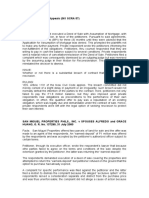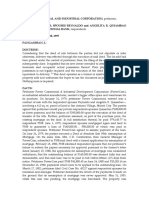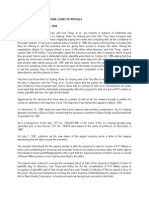SAN MIGUEL PROPERTIES PHILIPPINES, INC. vs. SPOUSES ALFREDO HUANG and GRACE HUANG
SAN MIGUEL PROPERTIES PHILIPPINES, INC. vs. SPOUSES ALFREDO HUANG and GRACE HUANG
Uploaded by
JoannaCopyright:
Available Formats
SAN MIGUEL PROPERTIES PHILIPPINES, INC. vs. SPOUSES ALFREDO HUANG and GRACE HUANG
SAN MIGUEL PROPERTIES PHILIPPINES, INC. vs. SPOUSES ALFREDO HUANG and GRACE HUANG
Uploaded by
JoannaCopyright
Available Formats
Share this document
Did you find this document useful?
Is this content inappropriate?
Copyright:
Available Formats
SAN MIGUEL PROPERTIES PHILIPPINES, INC. vs. SPOUSES ALFREDO HUANG and GRACE HUANG
SAN MIGUEL PROPERTIES PHILIPPINES, INC. vs. SPOUSES ALFREDO HUANG and GRACE HUANG
Uploaded by
JoannaCopyright:
Available Formats
SAN MIGUEL PROPERTIES PHILIPPINES, INC. vs.
SPOUSES ALFREDO HUANG and GRACE
HUANG
G.R. No. 137290 July 31, 2000
MENDOZA, J.:
Facts: San Miguel Properties Philippines, Inc. (SMPI) is a domestic corporation engaged in the purchase and sale of
real properties. Part of its inventory are two parcels of land totalling 1,738 square meters at the corner of Meralco
Avenue and General Capinpin Street, Barrio Oranbo, Pasig City, which are covered by TCT Nos. PT-82395 and PT-
82396 of the Register of Deeds of Pasig City. On 21 February 1994, the properties were offered for sale for
P52,140,000.00 in cash to Atty. Helena M. Dauz who was acting for respondent spouses as undisclosed principals.
The respondents offered that the sum of P500,000.00 would be given as earnest money and the balance would be
paid in eight equal monthly installments from May to December, 1994. However, petitioner refused the counter-
offer. On March 29, 1994, Atty. Dauz wrote another letter proposing that the sum of P1,000,000.00 would be given
as earnest-deposit and in case of failure of agreement it will be refunded to Sps. Huang. Sobrecaray, SMPI’s vice-
president and operations manager for corporate real estate, indicated his conformity to the offer. However, on 7 July
1994, SMPI informed Atty. Dauz that because the parties failed to agree on the terms and conditions of the sale
despite the extension granted by SMPI, the latter was returning the amount of P1 million given as “earnest-deposit.”
On the other hand, Sps. Huang through counsel, wrote SMPI demanding the execution within five days of deed of
sale covering the properties and attempted to return the “earnest-deposit” but SMPI refused on the ground that Sps.
Huang’s option to purchase had already expired.
Issue: Whether or not there is a perfected contract of sale upon payment and acceptance of earnest money.
Ruling: With regard to the alleged payment and acceptance of earnest money, the Court holds that respondents did
not give the P1 million as “earnest money” as provided by Art. 1482 of the Civil Code. They presented the amount
merely as a deposit of what would eventually become the earnest money or downpayment should a contract of sale
be made by them. The amount was thus given not as a part of the purchase price and as proof of the perfection of the
contract of sale but only as a guarantee that respondents would not back out of the sale. Respondents in fact
described the amount as an “earnest-deposit.” In the present case, the P1 million “earnest-deposit” could not have
been given as earnest money as contemplated in Art. 1482 because, at the time when petitioner accepted the terms of
respondents’ offer of March 29, 1994, their contract had not yet been perfected. This is evident from the following
conditions attached by respondents to their letter, to wit: (1) that they be given the exclusive option to purchase the
property within 30 days from acceptance of the offer; (2) that during the option period, the parties would negotiate
the terms and conditions of the purchase; and (3) petitioner would secure the necessary approvals while respondents
would handle the documentation.
The first condition for an option period of 30 days sufficiently shows that a sale was never perfected. As petitioner
correctly points out, acceptance of this condition did not give rise to a perfected sale but merely to an option or an
accepted unilateral promise on the part of respondents to buy the subject properties within 30 days from the date of
acceptance of the offer. Such option giving respondents the exclusive right to buy the properties within the period
agreed upon is separate and distinct from the contract of sale which the parties may enter.11 All that respondents
had was just the option to buy the properties which privilege was not, however, exercised by them because there was
a failure to agree on the terms of payment. No contract of sale may thus be enforced by respondents.
You might also like
- Negotiable Instrument Law Philippines PDFDocument51 pagesNegotiable Instrument Law Philippines PDFRSQ100% (1)
- Perpetual Grant Right of Way - For UploadDocument3 pagesPerpetual Grant Right of Way - For UploadRachel Chan100% (1)
- (Shay) de Leon Notes - Agency, Chap. 1Document15 pages(Shay) de Leon Notes - Agency, Chap. 1John MarstonNo ratings yet
- Insuring Risk in Construction ProjectsDocument25 pagesInsuring Risk in Construction ProjectsPuneet Arora100% (1)
- Sales - June 22Document65 pagesSales - June 22shambiruarNo ratings yet
- San Miguel Properties vs. Spouses HuangDocument7 pagesSan Miguel Properties vs. Spouses HuangKanglawNo ratings yet
- San Miguel Properties Philippines, Inc. vs. HuangDocument7 pagesSan Miguel Properties Philippines, Inc. vs. HuangElaine Belle OgayonNo ratings yet
- 118184-2000-San Miguel Properties Phils. Inc. v. Spouses PDFDocument8 pages118184-2000-San Miguel Properties Phils. Inc. v. Spouses PDFGoogleNo ratings yet
- San Miguel VS Spouses HuangDocument4 pagesSan Miguel VS Spouses HuangM A J esty FalconNo ratings yet
- San Miguel Properties Phils vs. Huang (336-SCRA-737)Document6 pagesSan Miguel Properties Phils vs. Huang (336-SCRA-737)Gra syaNo ratings yet
- Smppi V Huang DigestDocument2 pagesSmppi V Huang DigestRhett Mark EblahanNo ratings yet
- San Miguel Properties Philippines, Inc., Petitioner, vs. Spouses Alfredo HUANG and GRACE HUANG, RespondentsDocument37 pagesSan Miguel Properties Philippines, Inc., Petitioner, vs. Spouses Alfredo HUANG and GRACE HUANG, RespondentsGM AlfonsoNo ratings yet
- San Miguel Vs HuangDocument1 pageSan Miguel Vs HuangKling KingNo ratings yet
- San Miguel Properties Phil Inc Vs Huang G.R. No. 137290 July 31, 2000Document5 pagesSan Miguel Properties Phil Inc Vs Huang G.R. No. 137290 July 31, 2000medic102No ratings yet
- San Miguel Properties Phils Inc Vs HuangDocument2 pagesSan Miguel Properties Phils Inc Vs Huang000012No ratings yet
- San Miguel Properties vs. Sps. HuangDocument2 pagesSan Miguel Properties vs. Sps. HuangRoberts Sam100% (1)
- Sales CasesDocument9 pagesSales CasesRonaldNo ratings yet
- Philippine National Bank Vs Generoso de Jesus - G.R. No. 149295, Sept. 23, 2003Document3 pagesPhilippine National Bank Vs Generoso de Jesus - G.R. No. 149295, Sept. 23, 2003cecil fabroNo ratings yet
- Manila Metal Container Corporation VsDocument4 pagesManila Metal Container Corporation VsJackie CanlasNo ratings yet
- Velarde vs. Court of Appeals (361 SCRA 57)Document3 pagesVelarde vs. Court of Appeals (361 SCRA 57)Rhodz Coyoca EmbalsadoNo ratings yet
- San Mig Properties V Sps HuangDocument2 pagesSan Mig Properties V Sps HuangIanna Carmel QuitayenNo ratings yet
- Spouses Doromal Vs CaDocument11 pagesSpouses Doromal Vs CaArvin RobertNo ratings yet
- SALES Compiled CasesDocument33 pagesSALES Compiled CasesMrs. WanderLawstNo ratings yet
- Oblicon Contracts - CasesDocument10 pagesOblicon Contracts - CasesRaina Phia PantaleonNo ratings yet
- MANILA METAL CONTAINER Vs PNBDocument5 pagesMANILA METAL CONTAINER Vs PNBione salveronNo ratings yet
- Espouses Serrano Vs Caguiat GR 139173Document9 pagesEspouses Serrano Vs Caguiat GR 139173Dante CalambaNo ratings yet
- Group 3 - Case DigestDocument2 pagesGroup 3 - Case DigestJLNo ratings yet
- Sales (Digests)Document15 pagesSales (Digests)Christina_Sant_111100% (2)
- Isinama Ko Kahit Pangsales Yung Iba Kase Hndi Ko Alam Baka Magamit or Shit. Di Ko Mahanap Iba Sorry. Ang Yu V. Ca (December 02, 1994) FactsDocument4 pagesIsinama Ko Kahit Pangsales Yung Iba Kase Hndi Ko Alam Baka Magamit or Shit. Di Ko Mahanap Iba Sorry. Ang Yu V. Ca (December 02, 1994) Factsdnel13No ratings yet
- Sales Digests Compilation - Missing Dizon NavarraDocument30 pagesSales Digests Compilation - Missing Dizon NavarraRomnick JesalvaNo ratings yet
- Case Digest-Essential Requisites of Contract-Asuncion Vs CaDocument4 pagesCase Digest-Essential Requisites of Contract-Asuncion Vs CaKê MilanNo ratings yet
- Contracts 61 71Document16 pagesContracts 61 71Jimmy GuidaoenNo ratings yet
- G.R. No. 170405 February 2, 2010 RAYMUNDO S. DE LEON, Petitioner, Benita T. OngDocument9 pagesG.R. No. 170405 February 2, 2010 RAYMUNDO S. DE LEON, Petitioner, Benita T. Ongανατολή και πετύχετεNo ratings yet
- Sales Warranty CasesDocument44 pagesSales Warranty CasesKim Roque-AquinoNo ratings yet
- Ang Yu Asuncion v. CADocument4 pagesAng Yu Asuncion v. CAPepper PottsNo ratings yet
- Sale 11082021Document20 pagesSale 11082021Christopher GuevarraNo ratings yet
- Gr. 170405Document9 pagesGr. 170405Obin Tambasacan BaggayanNo ratings yet
- Lloyd S Enterprises Vs DolletonDocument7 pagesLloyd S Enterprises Vs DolletonMark Hiro NakagawaNo ratings yet
- De Leon vs. OngDocument3 pagesDe Leon vs. OngmeranezmjNo ratings yet
- G.R. No. 170405 February 2, 2010 RAYMUNDO S. DE LEON, Petitioner, Benita T. OngDocument7 pagesG.R. No. 170405 February 2, 2010 RAYMUNDO S. DE LEON, Petitioner, Benita T. OngZannyRyanQuirozNo ratings yet
- Platinum Plans vs. CucuecoDocument8 pagesPlatinum Plans vs. CucuecoSherwin Anoba CabutijaNo ratings yet
- Environment & Land Case 2315 of 2007Document7 pagesEnvironment & Land Case 2315 of 2007ashuumusungugmailcomNo ratings yet
- Sales DigestDocument16 pagesSales DigestJD BarcellanoNo ratings yet
- Facts:: Nature of Sales Fule v. CA 286 SCRA 698 (1998)Document7 pagesFacts:: Nature of Sales Fule v. CA 286 SCRA 698 (1998)emgraceNo ratings yet
- 48.PCIC Vs CA, 274 SCRA 597 (1997)Document2 pages48.PCIC Vs CA, 274 SCRA 597 (1997)Rebuild BoholNo ratings yet
- Robles v. CA - RepurchaseDocument4 pagesRobles v. CA - RepurchaseMarlon TabilismaNo ratings yet
- Ang Yu Asuncion - VazquezDocument10 pagesAng Yu Asuncion - VazquezMariaAyraCelinaBatacanNo ratings yet
- Adelfa Properties, Inc. vs. CADocument4 pagesAdelfa Properties, Inc. vs. CAEd NerosaNo ratings yet
- Law On Sales Digested CasesDocument135 pagesLaw On Sales Digested CasesMonaliza BanaNo ratings yet
- 117633-2000-Laforteza v. Machuca PDFDocument12 pages117633-2000-Laforteza v. Machuca PDFNichole Patricia PedriñaNo ratings yet
- Sales Case DigestDocument10 pagesSales Case DigestSohayle Boriongan MacaunaNo ratings yet
- MarrySuanNotes SALES CaseDigest2015Document64 pagesMarrySuanNotes SALES CaseDigest2015Angel DeiparineNo ratings yet
- Daryl Canoza - Sales CasesDocument11 pagesDaryl Canoza - Sales CasesDaryl Dominic F CanozaNo ratings yet
- De Leon V OngDocument7 pagesDe Leon V OngChino RazonNo ratings yet
- First Batch of CasesDocument55 pagesFirst Batch of Casesdot_rocksNo ratings yet
- Case Digest SaleDocument11 pagesCase Digest SaleLexa L. DotyalNo ratings yet
- Ang Yu Vs AsuncionDocument2 pagesAng Yu Vs AsuncionWinona Marie Dohig BaquialNo ratings yet
- Agency Part 2 A To e Cases DigestDocument11 pagesAgency Part 2 A To e Cases Digestruby vinluanNo ratings yet
- Heirs of Andres v. Vicente RodriguezDocument12 pagesHeirs of Andres v. Vicente RodriguezElizabeth LotillaNo ratings yet
- Law On Sales Digested CasesDocument135 pagesLaw On Sales Digested CasesThrees SeeNo ratings yet
- Cape Law: Texts and Cases - Contract Law, Tort Law, and Real PropertyFrom EverandCape Law: Texts and Cases - Contract Law, Tort Law, and Real PropertyNo ratings yet
- U.S. v. Sun Myung Moon 532 F.Supp. 1360 (1982)From EverandU.S. v. Sun Myung Moon 532 F.Supp. 1360 (1982)No ratings yet
- NAVA Vs PEERS MARKETINGDocument1 pageNAVA Vs PEERS MARKETINGJoannaNo ratings yet
- DE SILVA Vs ABOITIZDocument1 pageDE SILVA Vs ABOITIZJoannaNo ratings yet
- GARCIA Vs LIM CHU SINGDocument1 pageGARCIA Vs LIM CHU SINGJoannaNo ratings yet
- PHIL TRUST Vs RIVERADocument1 pagePHIL TRUST Vs RIVERAJoannaNo ratings yet
- REPUBLIC PLANTERS BANK Vs HON. AGANADocument2 pagesREPUBLIC PLANTERS BANK Vs HON. AGANAJoannaNo ratings yet
- Coronel, Et Al VS CaDocument1 pageCoronel, Et Al VS CaJoannaNo ratings yet
- MIRANDA vs. TARLAC RICE MILLDocument3 pagesMIRANDA vs. TARLAC RICE MILLJoannaNo ratings yet
- Mangila Vs CADocument2 pagesMangila Vs CAJoannaNo ratings yet
- 12 Banez Vs ValdevillaDocument1 page12 Banez Vs ValdevillaJoannaNo ratings yet
- SAN LORENZO DEVELOPMENT CORPORATION vs. COURT OF APPEALS, PABLO S. BABASANTA, SPS. MIGUEL LU and PACITA ZAVALLA LUDocument1 pageSAN LORENZO DEVELOPMENT CORPORATION vs. COURT OF APPEALS, PABLO S. BABASANTA, SPS. MIGUEL LU and PACITA ZAVALLA LUJoannaNo ratings yet
- DBT Mar BayDocument2 pagesDBT Mar BayJoannaNo ratings yet
- Gaite Vs FonacierDocument1 pageGaite Vs FonacierJoannaNo ratings yet
- TOPA Assignment ChargeDocument8 pagesTOPA Assignment ChargeShivam SinghNo ratings yet
- F 706Document31 pagesF 706Bogdan PraščevićNo ratings yet
- The Legal Environment of Business - Ch. 9 Flashcards - Quizlet3Document12 pagesThe Legal Environment of Business - Ch. 9 Flashcards - Quizlet3dale huevoNo ratings yet
- Development Agreement For Immovable Property: Question No. 20Document36 pagesDevelopment Agreement For Immovable Property: Question No. 20divya8choudharyNo ratings yet
- Special Proceedings: Rule 72 Subject Matter and Applicability of General RulesDocument22 pagesSpecial Proceedings: Rule 72 Subject Matter and Applicability of General RulesJ.C. S. MaalaNo ratings yet
- Fair Labor Standards Act of 1938 PDFDocument2 pagesFair Labor Standards Act of 1938 PDFKatieNo ratings yet
- Brad Verthein "Letter of Resignation"Document2 pagesBrad Verthein "Letter of Resignation"David GiulianiNo ratings yet
- Zosima vs. SalimbagatDocument12 pagesZosima vs. SalimbagatKelsey Olivar MendozaNo ratings yet
- Law of Contract IiDocument1 pageLaw of Contract IiPrashant RahangdaleNo ratings yet
- Service Provide Agreement (With Effect From January 2022)Document28 pagesService Provide Agreement (With Effect From January 2022)Govind RathaurNo ratings yet
- BST CH 10Document21 pagesBST CH 10Dilip KumarNo ratings yet
- 11 Auditor's Legal LiabilityDocument28 pages11 Auditor's Legal LiabilityKristine MontenegroNo ratings yet
- Capital Gains Tax Planning - EXEMPTEDDocument8 pagesCapital Gains Tax Planning - EXEMPTEDahanaghosal2022No ratings yet
- 5.2 Home Assignment Questions - House PropertyDocument2 pages5.2 Home Assignment Questions - House PropertyAashi GuptaNo ratings yet
- Ba Final Outline WagnerDocument37 pagesBa Final Outline WagneradamNo ratings yet
- CARtime Application Form July 2023 - Part 1 - FillableDocument7 pagesCARtime Application Form July 2023 - Part 1 - Fillable208048022No ratings yet
- Yu V Judge Reyes-CarpioDocument4 pagesYu V Judge Reyes-CarpioJosine ProtasioNo ratings yet
- Commercial General Liability Coverage FormDocument16 pagesCommercial General Liability Coverage FormIbrahim KhatatbehNo ratings yet
- XDM Flash Programmer For V82R4Document12 pagesXDM Flash Programmer For V82R4ValeryNo ratings yet
- Casis Agency Full Text CompilationDocument903 pagesCasis Agency Full Text CompilationBer Sib JosNo ratings yet
- Answer: C. Payment BondDocument4 pagesAnswer: C. Payment BondPaula Patrisha RoxasNo ratings yet
- A Life Link 2 Brochure v3Document14 pagesA Life Link 2 Brochure v3Hang LekiuNo ratings yet
- Corporate Mar13 Iyr PPT NotesDocument19 pagesCorporate Mar13 Iyr PPT NotesNeha JayaramanNo ratings yet
- Law On SALESDocument4 pagesLaw On SALESAlfie OmegaNo ratings yet
- Section 2 Property Rights of A PartnerDocument7 pagesSection 2 Property Rights of A PartnerRochelle LumanglasNo ratings yet
- A Study On The Effect of Consent Induced by Coercion and Undue Influence On The Validity of The ContractDocument24 pagesA Study On The Effect of Consent Induced by Coercion and Undue Influence On The Validity of The ContractMr. None100% (1)





































































































